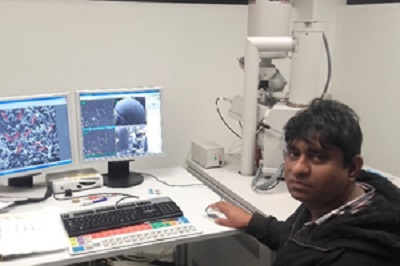Measuring the impact of soil fluorine
Thangavelautham Geretharan (Gere) pioneered research in an aspect of soil health that had largely been ignored – fluorine’s impact on nitrogen-fixing bacteria.
 The Sri Lankan PhD student says he was interested in measuring its effect, given nitrogen-fixing bacteria are a fundamental part of New Zealand’s legume-based pastoral farming system.
The Sri Lankan PhD student says he was interested in measuring its effect, given nitrogen-fixing bacteria are a fundamental part of New Zealand’s legume-based pastoral farming system.
“Phosphate fertiliser is ordinarily added to New Zealand pastures and fluorine is an impurity of this fertiliser. When superphosphate fertiliser is added continuously the fluorine content of the soil increases. I wanted to investigate whether soil fluorine has a detrimental effect on nitrogen-fixing bacteria. I also wanted to see what impact soil fluorine has on living organisms in the soil.”
Nitrogen is essential for the growth of plants. Nitrogen-fixing bacteria are microorganisms present in the soil or in plant roots that change nitrogen gases from the atmosphere into nitrogen compounds that plants can use in the soil.
Gere’s research builds on a new and simple total fluorine measurement method, sodium hydroxide extraction, which was commissioned by the Fertiliser Association and developed by Jeyakumar and Anderson in 2015. “I found that sodium hydroxide extraction is a suitable method for determining the total soil fluorine content,” says Gere. “I also used calcium chloride and water extraction to measure the amount of the total soil fluorine that is actually available to affect living organisms.”
Gere focused on measuring the toxic effects of fluorine on nitrogen-fixing bacteria and its interaction with white clover – a widely cultivated pasture legume in New Zealand.
“Encouragingly, my research so far seems to indicate no imminent risk from soil fluorine on nitrogen-fixing bacteria. I also found that the fraction of the soil fluorine content that is potentially affecting the living organisms is very small in New Zealand agricultural soil.
“Once I’ve completed the research, my findings will be very useful for developing fluorine guidelines for New Zealand agricultural soil.”
Gere commenced his PhD in April 2016 under the supervision of Professor Christopher W.N. Anderson, Dr Paramsothy Jeyakumar (Jeya) and Dr Michael Bretherton through the School of Agriculture and Environment at Massey University. His research is funded by the Fertiliser Association of New Zealand.

